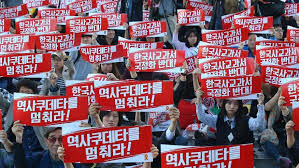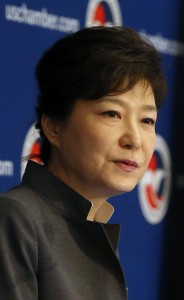Moves by the Park Administration to reintroduce a state-authored history textbook system are seen by many South Koreans as an attempt to gloss over recent history, writes HYUNG-A KIM.
President Park Geun-hye’s recent move to replace privately published middle and high school history textbooks with a single, state-authored history textbook system by early 2017 has rocked Korean society and provoked massive protests calling for her resignation.
On 5 December, some 14,000 protesters, including unionised workers, who detest the Park Administration’s renationalisation of history textbooks, and its labour reforms, rallied in Seoul. This followed an initial protest on 14 November, which drew some 130,000 people—the largest antigovernment protest in several years—and saw violent clashes between protesters and police.
Protesters and other critics, who are mostly seen as progressives, argue that the renationalisation of the history textbook system is an attempt to whitewash the legacy of South Korea’s conservative elites, including that of Park’s own father, former President Park Chung-hee (1963–79). In the case of Park Chung-hee, two key accounts are at issue: his collaboration with the Japanese colonial forces as an Imperial Japanese officer during the colonial era, and his dictatorship after he seized power in a military coup in 1961, especially under his Restoration (Yushin) system from October 1972 until his assassination in 1979.

Supporters of Park Geun-hye’s move, who are predominantly seen as conservatives, credit her father with South Korea’s rapid economic development and industrialisation. In South Korea, one is routinely labelled either as conservative or progressive based on whether one has a positive or negative view of Park Chung-hee’s legacy, and these dichotomies, which define the terms of South Korean political discourse, were initially articulated during Park’s phenomenal and controversial effort at nation-building.
In this regard, the real issue behind Park Geun-hye’s decision to renationalise history textbooks is not so much to do with history itself, but with politics—more specifically, her conservative wedge politics of political hegemony.
The official reason for a renationalisation of history education, as expressed by Park herself during a Cabinet meeting on 10 November, is that ‘reunification of [North and South Korea] would be difficult without a clear view of history and, even if unified, there may arise a situation wherein we may become ideologically subjugated’. Furthermore, she added, ‘If [young students] don’t learn history accurately, [their] souls inevitably would become abnormal.’
The teaching of history in Korea has been one of the most controversial issues since Japanese colonisation in 1910. Much of this controversy arises from Korea’s political and colonial history itself. For example, the Republic of Korea (ROK), according to the ROK Constitution, was founded in 1919 when a provisional government was established in Shanghai shortly after the March First Independence Movement during Japanese colonial rule. This has been widely accepted as fact to date. However, according to the current prime minister, Hwang Kyo-ahn, who confirmed the government’s plan for state-authored textbooks, the ROK was founded on 15 August by the Syngman Rhee administration (1948–60)—an idea advocated by the conservative civic groups known in South Korea as The New Right.
Freedom to choose
From 1974 until 2009, South Korea required schools to use a single, government-issued history textbook. Since 2010, however, all schools have been free to choose from eight different history textbooks, distributed by private publishers after their approval by the Education Ministry. Some of these books delve into long-hidden aspects of Korea’s recent history: collaboration with Japanese colonialists, mass killings of civilians during the Korean War and the abuse of political dissidents under the dictators.
Conservatives have criticised these books, arguing that they were written by historians and teachers with ideological biases who were infusing youngsters with left-leaning nationalism that promoted ethnic affinity with North Korea. These historians and teachers have also been accused of moulding an ideologically unfavourable perspective on the role of the United States in modern Korean history
In 2013, conservative scholars published a rival textbook to counter the predominance of progressive versions of Korean history, but it was criticised for watering down or distorting the legacy of pro-Japanese collaborators and state-sponsored brutality in South Korea’s modern history. It was also criticised for embellishing the achievements of Park Chung-hee. As a result, it was adopted by just three of the country’s 2300 high schools.
Some civic groups, students, university professors and other regional educators argue that President Park’s move to a state-authored history textbook system similar to that in North Korea will embarrass Korea internationally. The leading opposition group, the New Politics Alliance for Democracy (NPAD), has indicated that it would work on a Bill to veto the government from writing textbooks. But the ruling Saenuri Party, which dominates the National Assembly, firmly supports Park’s move. As Park is known for her political craftiness and as a woman of her word, it would be naive to assume she would push this textbook project knowing that, if regime change occurs in the 2017 presidential election, it would end up as just a one-year project.
According to Park Han-yong, a senior staff member of the Institute for Research in Collaborationist Activities, an ultra-progressive civic group, this is ‘a history coup that supporters of pro-Japanese collaboration and the past dictatorship have been preparing for 10 years’. The Quarterly Changbi (Winter, no. 43, 2015), a leading progressive journal in Korea, goes further, arguing that the Park Administration’s decision to establish a single, state-authored history textbook system is not a history coup d’état, but a new type of creeping coup, tailor-made to suit Korea in the twenty-first century, to ‘reconstruct a permanent ruling system by an ultra-conservative force’.
‘If we don’t try to inculcate the students with historical convictions and pride, we may be culturally and historically subjugated by another country.’
This view seems to reflect a prevalent stance by progressives who are wary of the probability of the Park Administration making political progress in the lead-up to the presidential election in December 2017, and of Park’s more immediate aim to win a conservative victory in the general elections in April 2016.
Park may well be genuinely concerned about the portrayal of Japanese colonialism and the postcolonial South Korean dictatorships in history books. And she may well want to tone down Korean collaboration with Japanese colonial authorities and provide a more balanced narrative of Korea’s contemporary history, especially of her father’s era. Thus Park and her conservative supporters argue that new ‘correct’ textbooks are necessary, because leftist teachers and historians have infected history education with communist sympathies and pro-North Korea jongbuk ideology. Or is she simply aiming to rehabilitate her father’s impaired reputation as a military dictator, as many believe?
Park argues: ‘We are witnessing a rapid shift in Northeast Asia and its vicinity. Given the situation, if we don’t try to inculcate the students with historical convictions and pride, we may be culturally and historically subjugated by another country.’ Her history textbook stance, however, contradicts her own stance against Japanese prime minister Shinzo Abe, whom she repeatedly accuses of using textbooks to indoctrinate young Japanese with a whitewashed and increasingly nationalistic version of Japan’s modern colonialist history. In politics, however, contradictions are quickly forgotten.

With her reputation as the ‘Queen of Elections’, Park has already said voters should choose ‘sincere people’ in next year’s general elections. She publicly chastised the then floor leader of the ruling Saenuri Party, Yoo Seung-min, for committing ‘politics of betrayal’ by agreeing with the opposition parties to pass a revision Bill on parliamentary law that included a clause to enable the legislature to call more autonomously for a revision of government-initiated legislation. Not only did Yoo resign shortly after, under pressure, but this incident alerted the Korean public, media and political community to ‘hanging onto the president’s every word’.
Knowing full well that Park’s word can affect the fate of a capable politician, as in Yoo’s case, the whole country has become wary about what Park says or does, especially concerning how that may impact upon changes in the preselection of ruling Saenuri Party candidates for the general elections in April and the presidential election in 2017.
Park is the only politician in South Korea today with a cult-like 30 per cent approval rating drawn mainly from her home region of Youngnam, which includes Daegu, a city where Park retains majority support. Indeed, no conservative Saenuri politician from Daegu, such as Yoo, can survive without Park’s endorsement.
With this extraordinary approval rating, combined with her strong hold on the ruling Saenuri Party, Park—unlike her predecessors who became lame ducks from the third year of their five-year tenure—could well be bypassing the lame-duck period by engineering her own style of conservative wedge politics, mainly through rewriting history which, as contentious as it is, has the potential to extend the conservatives’ dominance well beyond the term of her presidency.
In this regard, Park’s position is advantaged largely because of the poor performance of the opposition parties, especially the NPAD, which shows no signs of leadership, or internal unity. Unless opposition parties can radically change themselves and put an end to Park’s conservative wedge politics, she may well be the first Korean president since the country democratised in 1987 to leave her legacy of rewriting history beyond her presidential tenure— regardless of whether it’s loved or loathed.
Ultimately, the Korean people’s bottom-up democracy seems to be at a crossroad over Park’s wedge politics, for as George Orwell wrote in 1984, ‘Who controls the past … controls the future … who controls the present controls the past.’
Main photo:
Honouring President Park Chung-hee in an Army Parade at Armed Forces Day on October 1, 1973 (Image : Baek, Jong-sik. Used under a Creative Ccommons licence).

